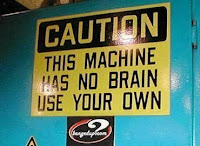Yes, it’s true! The ID Taliban brought about Baylor Prez Lilley’s downfall …
Apparently, some fans of the ruins of neo-Darwinism think that President John Lilley’s departure from Baylor relates to intelligent design. So Rack Jite:
Though matters of tenure and logo design (believe it or not) are reported as the reasons, it was about no such thing. Rather it is the revenge of Baptist fundamentalists over encroaching secularism regards Intelligent Design. Ever since ID guru William Dembski resigned in 2000 because Baylor closed the door on his Intelligent Design department room (as it had became the laughing stock of World academia) the Taliban wing at Baylor has been festering to make its move.
and the Prophet likewise preaches on Rack Jite’s text.
It gives one pause for thought that anyone could believe such foolishness, in view of the fact that
1. Lilley fell out with a number of his academic deans by rejecting an unusual number of tenure causes – essentially slapping the deans in the face and undermining their credibility with their peers. The response was an overwhelming no-confidence vote, and in the wake of that, well, he should have started the job hunt the morning after. Were I a friend, I would give him precisely that urgent advice.
2. I have not heard any evidence cited that the deans who voted against Lilley did so because they supported ID. Indeed, from monitoring a good part of the discussion here, I would say that you couldn’t necessarily predict a person’s support for ID by how they felt about Lilley’s governance or vice versa.
3. I hope that a person who thinks logos and branding are not important has the good sense never to blunder into a fight with Disney, Inc.
An ID sympathizer writes to say, “What struck me about these posts is how deluded and obsessed these people are. The world does not revolve around ID politics, and yet they blame Lilley’s downfall on us!”
Yes, but remember, the whole world is a vast right-wing conspiracy so everything really does revolve around ID politics – it just doesn’t look that way because the ID Taliban has immense power via the Chimpy McBushitler Conspiracy and is so very clever at disguising it.
Also, Just up at Colliding Universes: Read More ›
